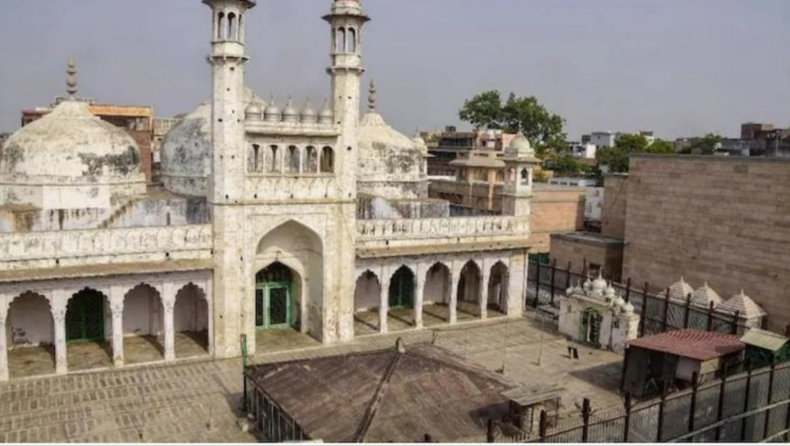District Judge AK Vishvesh ordered that Gyanvapi Case would continue to hear the petition seeking the right to worship. The next hearing of the case is on September 22.
Highlights
- The court rules that Gyanvapi plea is maintainable
- Gyanvapi hearing will continue: Judge
- Varanasi Court rejects Anjuman Intezamia Committee’s plea
The Varanasi Districts and Sessions court confirmed the maintainability of the Hindu side’s petition in the Gyanvapi mosque complex case. A single bench of district Judge AK Vishvesh delivered the verdict in the Gyanvapi Shringar Gauri dispute case on Monday.
The Varanasi District Court rejected the petition of the Muslim side. So, the mosque side plea has not been allowed. In the court the suit by Hindu parties is maintainable.
The Hindu side’s advocate, Vishnu Shankar Jain, said, “The court rejected the Muslim side’s petition and said the suit is maintainable. The next hearing of the case is on September 22.”
“Muslim petitioners are likely to approach Allahabad High Court in appeal. It’s a win for the Hindu community. It’s a foundation stone for the Gyanvapi temple. Appeal to people to maintain peace,” said petitioner Sohan Lal Arya.
In the order, the judge said, “In view of the discussions and analysis, I have come to the conclusion that the suit of the plaintiffs is not barred by the Places of Worship (Special Provision) Act, 1991, The Waqf Act, 1995, and the UP Sri Kashi Vishwanath Temple Act, 1983, and the application 35C filed by the defendant no. 4 (Anjuman Intezamia) is liable to be dismissed.”
In 10 minutes in the presence of restricted 32 persons, the district judge delivered a 26-page order inside the courtroom. An advocate who was present in the courtroom said, lawyers of the two sides and plaintiffs were presented there.
Maulana Khalid Rashid Farangi Mahli, member of the All India Muslim Personal Law Board said, “The team of legal experts will explain in detail the verdict of the court, and then further line of action will be taken. Whatever Supreme Court said regarding Place of Worship in the Babri Masjid case we were hopeful that all issues related to temples and mosques would be resolved.”
Muslim petitioners, mainly mosque administrators, want the petition dismissed. They said they are ready to fight till the Supreme Court. However, their challenges were denied. “Such petitions and sealing of mosques will lead to public mischief and communal disharmony”, said the Muslim petitioners.
The Intezamia had questioned the maintainability of the women’s petition, citing the Places of Worship (Special Provisions) Act, 1991. The act says any public places of worship must be maintained as they were on August 15, 1947, with the exception of the Babri Masjid.
What is the Gyanvapi Mosque row all about?

The Gyanvapi case was started in August 2021, when five Hindu women went to the Varanasi Civil Court asking for permission to worship one of the shrines presented in the mosque.
They also claimed that the mosque complex contains items depicting Hindu Gods and Goddesses. They had filed the petition looking for permission for regular worship of Hindu deities. Gyanvapi mosque in Varanasi is next to the famous Kashi Viswanath temple.
The Gyanvapi mosque is one of the several mosques that Hindu hardliners believe were built after demolishing a part of the original Kashi Vishwanath temple on Aurangzeb’s orders. It is located in Prime Minister Narendra Modi’s constituency (Varanasi).
In April this year, the Varanasi Civil Court that was hearing the matter at that point of time ordered a video survey. The Hindu side had alleged in the lower court that during the video-graphic survey of the Gyanvapi mosque-Shringar Gauri complex, a Shivling or relic of Lord Shiva was found. However, it was opposed by the Muslim side. However, Intezamia said it was only a part of a defunct fountain used in the past for wuzu, the ritual cleansing before prayers.
The court then sealed the pond and also banned large namaz gatherings in the mosque. Furthermore, the court said, the gatherings should be restricted to 20 people.
Security tightened ahead of the verdict

Section 144 has been imposed and security has been tightened to maintain law and order, after the Varanasi court verdict in the Gyanvapi mosque case. Outside the Varanasi court, more than 250 policemen have been deployed.
Lucknow Police Commissioner SB Shiradkar said, “We did a flag march to create a sense of security among people.” Outsiders were not permitted to stand around the court premises.
Presently, Hindus are allowed to worship only on the fourth day of Chaitra Navaratri at the Shringar Gauri.












